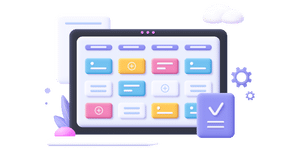To celebrate National Apprenticeship Week 2023, we’re taking the opportunity to introduce some of the learners on our Level 3 and Level 5 Management Apprenticeship programmes and ask them to share the different (and sometimes surprising!) ways that their apprenticeships have helped them to develop, grow and succeed in their roles.

In line with this year’s theme – Skills for Life – we have interviewed some of our apprentices about their programmes and the skills they have been gaining and developing on them. The skills covered in the Level 3 (Team Leader/Supervisor) and Level 5 (Operations/Departmental Manager) apprenticeship standards are skills for life in every way; they help apprentices to undetake highly effective management and leadership whatever sector they work in and at whatever stage of their career they have reached.
Read on to meet Emily and Dáire and find out about their favourite elements of the programme, how their day-to-day work has benefitted from their learning, and more!

Hi Emily! Thanks for speaking to us. Firstly, where do you work and how long have you been there?
I work for an Engineering company, I am the Senior Commercial Manager and I have been there for nearly 13 years.
Which apprenticeship programme are you on?
Level 5 Operations/Departmental Manager
What skill or area of your day-to-day work do you think has benefitted the most from your apprenticeship?
There are a number of skills that I have been able to develop or improve having completed the apprenticeship but the key ones that stand out for me, are the time management techniques, coaching and mentoring skills and models, and managing relationships within a diverse-personality environment.
My perspective was changed with regards to delegation too. I often saw it as a ‘lesser’ option as it would possibly take longer to pass the work on than it would do to do the work myself. In doing that, I am taking opportunity and power away from others. I think that although it may be more of an effort initially, the positive results are worth it.

What topic from your apprenticeship have you found easiest to transfer into your day-to-day work, and why?
I found myself using coaching and mentoring style models/skills in day-to-day conversations. I liken the questioning and problem-solving techniques to therapy, in as much as you are guiding the mentee or coachee to find their own path and solutions by asking the right types of questions.
What’s the most interesting thing you’ve learned on your apprenticeship? (about yourself OR about management & leadership theory/practice)?
I really enjoyed the Self Awareness module. I think it gives you a different perspective on the relationships within the working environment. Knowing your own ‘self’ enables you to see others through a different lens and if required, adapt your behaviour, in order to work alongside others, enabling you to get the best out of your co-workers and colleagues. It was easy to put this learning into practice.

What’s been your favourite element of the of the programme?
It was unfortunate that COVID hit, only four months after our course started so we had a few face-to-face workshops before we all went online. I enjoyed hearing from other apprentices during these discussions, as being able to see how all the modules can be applied to a number of wide-ranging industries was very interesting and allowed me to ‘think outside the box’.
What surprised you most about your apprenticeship?
In my role, although I am a Manager, I manage the ‘function’ and not people. I assumed that this meant, given the title of the apprenticeship, that I would have to be creative with my assessments and evidence. I soon realised that management and leadership skills can be applied to most situations, inside and outside of work. I find myself remembering and using certain models and techniques in everyday work and life.
What advice would you pass on to anyone starting a management apprenticeship?
It’s a very interesting and useful apprenticeship and Eliesha deliver the course very well and with an enormous amount of support. Having a supportive and patient line manager is also key. There is a lot of work involved but you get out of it, what you’re willing to put in.
Thanks again for speaking to us Emily! To finish – the theme of National Apprenticeship Week 2023 is ‘Skills for Life’ – of the skills you’ve developed or enhanced during your programme, which one do you think will benefit you the most for the rest of your career?
The most beneficial for me, is the key skills of a manager and leader and the differences between the two. There are times and places for both within an organisation, but leadership skills are those that can be applied inside and outside of work. Understanding the impact that organisational culture, expectations and personal working styles can impact leadership style is important and can help to understand other leaders within the business and their motivation for leading in various ways.

Hi Dáire! Thanks for speaking to us. Firstly, what do you do and how long have you been in that role?
I’m a Training and eLearning Manager and I’ve been in this role for 12 months.
Which apprenticeship programme are you on?
The Level 5 Operations/Departmental Manager
What skill or area of your day-to-day work do you think has benefitted the most from your apprenticeship?
All really valuable so far but definitely problem solving and decision making and project management. My work is mainly project based but I have no formal qualifications in project management, alongside the other learning I feel this has been a great module. Looking forward to the finance module as I feel it will accompany the project management module/learning well.
What topic from your apprenticeship have you found easiest to transfer into your day-to-day work, and why?
Project management – my role is project based, this has been a really valuable module and learning experience for me. Andy the tutor has provided great insight in the 1-1s around this as well.

What’s the most interesting thing you’ve learned on your apprenticeship? (about yourself OR about management & leadership theory/practice)?
That I search for perfection too much, e.g. trying to be perfect with time management. Since working with the team at Eliesha I have realised how to manage this aspect of my behaviour.
What’s been your favourite element of the of the programme?
Quite a range of things, I see a lot of value in the 1-1s. I feel that they either setup great learning pre-workshop or help embed theory post workshop. I also love that the tutor asks us to critically assess any of the theories and don’t just accept them for what they are.
What surprised you most about your apprenticeship?
The change in my thinking and behaviour already after less than 12 months.

What advice would you pass on to anyone starting a management apprenticeship?
Do it, working with a range of apprentices from different sectors has offered great value and really highlights how effective Action Learning Sets are. Apply yourself and you will get loads from it.
Thanks again for speaking to us Dáire! To finish – the theme of National Apprenticeship Week 2023 is ‘Skills for Life’ – of the skills you’ve developed or enhanced during your programme, which one do you think will benefit you the most for the rest of your career?
Having a more strategic approach to work and really seeing how I often revert to tactical too quickly. Doing this apprenticeship has helped develop my strategic thinking, skills and behaviours.

Eliesha runs both open and closed programmes for the Level 3 (Team Leader/Supervisor) and Level 5 (Operations/Departmental Manager) Apprenticeship Standards – meaning we form cohorts made up of learners from multiple employers, and we run internal programmes made up entirely of apprentices from the same organisation.
To start the conversation about how Management Apprenticeships can support your organisational learning needs and, whether you are spending Levy funds or claiming non-Levy funding, represent a cost effective development solution, send us an email or fill out an enquiry form to arrange an exploratory chat.
Our next open programmes will start later this year and a closed programme could start whenever your learners are ready, so we will have the flexibility to support you whatever your specific requirement or operational context.